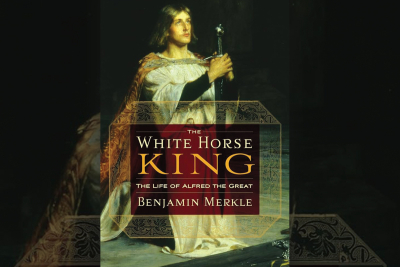Benjamin Merkle’s “The White Horse King: The Life of Alfred the Great” (Thomas Nelson, 2009, 272 pages) tells the story of the Wessex monarch who resisted the Vikings and after decades of fighting and prayer drove them out of his kingdom. He also began unifying Anglo-Saxon England into one realm, a merger only completed during the reign of Athelstan, Alfred’s grandson.
The ninth-century back-and-forth victories and defeats, the many Viking raids, often conducted by long ships up estuaries and rivers, and the place names of obscure battles could confuse modern readers, but Merkle does excellent work explaining this history and its participants. We learn how these battles were generally fought, the tactics behind the shield walls that both sides used, and the horrific slaughter that occurred when those walls were breached.
Merkle adeptly mingles historic realities with imaginative descriptions, which brings alive these long-ago events. In describing the Battle of Edington, which occurred in 878 A.D. and marked a turning point in the wars against the Vikings, he describes the breaking of the Viking shield wall: “Now the combat turned to the mad havoc of sword and axe fighting. Each man stood or fell by the quickness and power of his blows and the agility of his feet … On they fought, until the fields of Edington were drenched with Danish blood, and not one Viking remained standing on the place of slaughter.”
Despite these victories — Alfred also wisely devised a more intentional defense of towns and created a small standing force of warriors — these plaudits alone are not enough to earn Alfred the title of “The Great,” the only English monarch ever so honored. He became an adept diplomat in dealing both with the Viking invaders and the rulers of the other kingdoms. He saw that the Golden Age of the English Church, some 200 years in the past, was in need of polishing, and so instituted a series of reforms stressing devotion and education among the clergy. Realizing the importance of education, literacy in particular, he founded schools, insisted, much to their dismay, that some of his council learn to read, and had parts of the Bible translated into the vernacular. He revamped the civil laws, seeking more uniformity, and compiled a legal code, the Domboc, or Doom Book, with dooms meaning judgments or laws.
To have accomplished all these things while at the same time fending off a merciless enemy explains Alfred’s unique title.
And of course, there is the romance in Alfred’s story as well. With his army broken and scattered by the Vikings, he became a guerilla warrior of sorts, a sort of Saxon Swamp Fox like the great hero of the American Revolution, Francis Marion. His refusal to surrender, the hit and run tactics he practiced against the invaders, and his success at retaining the loyalty of a small band of stouthearted followers roused the spirits of other Saxons, and even today remains an example of resilience and courage in the face of seemingly overwhelming odds.
A primary reason for reading history and biographies like “The White Horse King” is to connect with figures like Alfred, those men and women from the past who overcame great odds and won their battles, whether on a bloody field or within the confines of their heart. We turn to them for inspiration and hope, while at the same time spurning those whose weakness, cowardice, or outright evil deeds marked them forever as exemplars to avoid.
We should also open these books, visit museums, and watch films of past events to ward off the presentism that today has so infected the world, particularly Western culture. Presentism occurs when we judge history solely through the lens of our own philosophies and prejudices. Some condemn the American past, for instance, for all sorts of sins, spotlighting its warts and blemishes while ignoring its marks of goodness and beauty. Nuance is lost, and along with it, truth.
Presentism also cripples our views of the present itself. We hear much these days of the stress of modern living, of how difficult it is to raise children, of the horrible state of our country. Reading “The White Horse King” reminds us that real stress is standing face to face with a man trying to kill you with an ax before you can kill him with a sword. The hungry, dirty children of Alfred’s time who were often cut down or sold into slavery by Viking raiders lends perspective to our complaints about childrearing. The near conquest of Britain by murderous invaders does the same for the quarrels of our own time.
Finally, we should read and learn some history because, whether we realize it or not, we belong to the past. In the beginning of “Look Homeward, Angel,” Asheville native Thomas Wolfe’s first book, we find this thought on history and time, “… our lives are haunted by a Georgia slattern, because a London cutpurse went unhung. Each moment is the fruit of forty thousand years.”
Some version of a London cutpurse, whether king or commoner, lives in us today, and every moment truly is the fruit of past millennia. Or as William Faulkner in “Requiem for a Nun” wrote, “The past is never dead. It’s not even past.”
Read history with your imagination on tap, and you’ll make yourself more fully human.
(Jeff Minick reviews books and has written four of his own: two novels, “Amanda Bell” and “Dust On Their Wings,” and two works of nonfiction, “Learning As I Go” and “Movies Make the Man.” This email address is being protected from spambots. You need JavaScript enabled to view it..)
